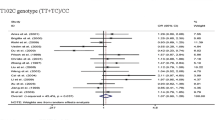Abstract
Major depression (MD) has a complex multifactorial aetiology with genetic and environmental factors contributing to this disorder. As with all antidepressant treatments, there is variability in drug response because of heredity, and this leads us to focus on the genetic polymorphism of the drug’s metabolising transporter genes. The serotonin transporter (5-HTT) gene is a particularly important candidate for genetic involvement in MD disorders owing to its key role in the regulation of serotonergic transmission and is therefore considered an interesting candidate in the mechanism of antidepressant drugs. Here, we studied the associations between genetic polymorphisms in two regions of the 5-HTT gene (5-HTTLPR and VNTR) to understand venlafaxine response. Venlafaxine was found to be effective in MD patients based on their HAM-D and CGI scores (p<0.05). Although the results did not yield a significant difference between the frequencies of the SS, LS, LL, 9/9, 10/10, 12/12 and 10/12 genotypes and venlafaxine response, venlafaxine dose was increased in patients with Stin2.12 and S alleles. These alleles might have a predisposition to mood disorders. Further studies with more patients are required to confirm this clinical association.
Similar content being viewed by others
References
Benkert O, Gründer G, Wetzel H and Hackett D (1996). A randomized, double-blind comparison of a rapidly escalating dose of Venlafaxine and imipramine in inpatients with major depression and melancholia. J. Psychiatr. Res. 30: 441–451.
Chen F and Lawrence AJ (2003). The effects of antidepressant treatment on serotonergic and dopaminergic systems in Fawn-Hooded rats: a quantitative autoradiography study. Brain Res. 976: 22–29.
Debonnel G, Saint-André E, Hébert C, de Montigny C, Lavoie N and Blier P (2007). Differential physiological effects of a low dose and high doses of Venlafaxine in major depression. Int. J. Neuropsychopharmacol. 10: 51–61.
Evans J, Battersby S, Ogilvie AD, Smith CA, Harmar AJ, Nutt DJ and Goodwin GM (1997). Association of short alleles of a VNTR of the serotonin transporter gene with anxiety symptoms in patients presenting after deliberate self harm. Neuropharmacology. 36: 439–443.
Gutiérrez B, Pintor L, Gastó C, Rosa A, Bertranpetit J, Vieta E and Fañanás L (1998). Variability in the serotonin transporter gene and increased risk for major depression with melancholia. Hum Genet. 103: 319–322.
Gursoy S (2002). Absence of association of the serotonin transporter gene polymorphism with the mentally healthy subset of fibromyalgia patients. Clin. Rheumatol. 21: 194–197.
Hammoumi S, Payen A, Favre JD, Balmes JL, Benard JY, Husson M, Ferrand JP, Martin JP and Daoust M (1999). Does the short variant of the serotonin transporter linked polymorphic region constitute a marker of alcohol dependence? Alcohol. 17: 107–112.
Heils A, Teufel A, Petri S, Stöber G, Riederer P, Bengel D and Lesch KP (1996). Allelic variation of human serotonin transporter gene expression. J. Neurochem. 66: 2621–2624.
Hranilovic D, Stefulj J, Schwab S, Borrmann-Hassenbach M, Albus M, Jernej B and Wildenauer D (2004). Serotonin transporter promoter and intron 2 polymorphisms: relationship between allelic variants and gene expression. Biol. Psychiatry. 55: 1090–1094.
Ito K, Yoshida K, Sato K, Takahashi H, Kamata M, Higuchi H, Shimizu T, Itoh K, Inoue K and Tezuka T, et al. (2002). A variable number of tandem repeats in the serotonin transporter gene does not affect the antidepressant response to fluvoxamine. Psychiatry. Res. 111: 235–239.
Lesch KP, Balling U, Gross J, Strauss K, Wolozin BL, Murphy DL and Riederer P (1994). Organization of the human serotonin transporter gene. J. Neural. Transm. Gen. Sect. 95: 157–162.
Lesch KP (2004). Gene-environment interaction and the genetics of depression. J. Psychiatry Neurosci. 29: 174–184.
MacKenzie A and Quinn J (1999). A serotonin transporter gene intron 2 polymorphic region, correlated with affective disorders, has allele-dependent differential enhancer-like properties in the mouse embryo. Proc. Natl. Acad. Sci. 96: 15251–15255.
Narita M, Nishigami N, Narita N, Yamaguti K, Okado N, Watanabe Y and Kuratsune H (2003). Association between serotonin transporter gene polymorphism and chronic fatigue syndrome. Biochem Biophys. Res. Commun. 311: 264–266.
Pata C, Erdal ME, Derici E, Yazar A, Kanik A and Ulu O (2002). Serotonin transporter gene polymorphism in irritable bowel syndrome. Am. J. Gastroenterol. 97: 1780–1784.
Roman DL, Walline CC, Rodriguez GJ and Barker EL (2003). Interactions of antidepressants with the serotonin transporter: a contemporary molecular analysis. Eur. J. Pharmacol. 479: 53–63.
Rothman RB and Baumann MH (2002). Therapeutic and adverse actions of serotonin transporter substrates. Pharmacol. Ther. 95: 73–88.
Takahashi H, Yoshida K, Ito K, Sato K, Kamata M, Higuchi H, Shimizu T, Ito K, Inoue K, Tezuka T, Suzuki T, Ohkubo T and Sugawara K (2002). No association between the serotonergic polymorphisms and incidence of nausea induced by fluvoxamine treatment. Eur. Neuropsychopharmacol. 12: 477–481.
Thompson MD, Gonzalez N, Nguyen T, Comings DE, George SR and O’Dowd BF (2000). Serotonin transporter gene polymorphisms in alcohol dependence. Alcohol. 22: 61–67.
Tsai SJ and Hong CJ (2003). Pharmacogenetics of selective serotonin Reuptake inhibitor response in major depression. Current harmacogenomics. 1: 1–7.
Zoroglu SS, Erdal ME, Alasehirli B, Erdal N, Sivasli E, Tutkun H, Savas HA and Herken H (2002). Significance of serotonin transporter gene 5-HTTLPR and variable number of tandem repeat polymorphism in attention deficit hyperactivity disorder. Neuropsychobiology. 45: 176–181.
Author information
Authors and Affiliations
Corresponding author
Rights and permissions
About this article
Cite this article
Yuksel, N., Dogan, O., Ergun, M.A. et al. Correlation between SERT polymorphisms and Venlafaxine response in major depression patients. Genes Genom 32, 217–223 (2010). https://doi.org/10.1007/s13258-009-0894-8
Received:
Accepted:
Published:
Issue Date:
DOI: https://doi.org/10.1007/s13258-009-0894-8




